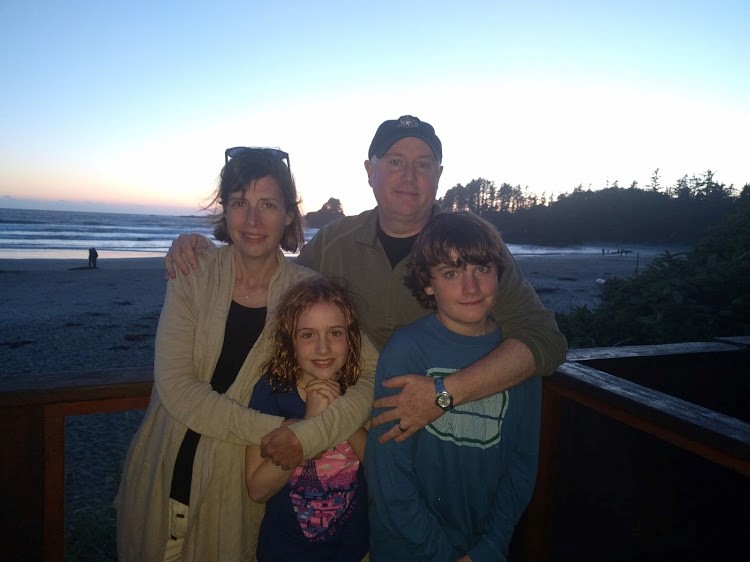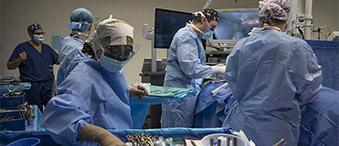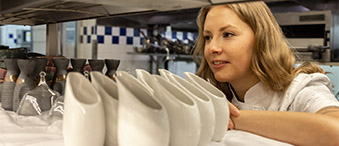Immunotherapy provides a second chance after dire lung cancer diagnosis
As a lawyer, Andrea Redway has worked on international initiatives relating to justice reform. She’s travelled the world tackling big projects and has always been ready to face new challenges head-on—but nothing could have prepared Andrea for a stage 4 lung cancer diagnosis. This diagnosis rocked her world and left her wondering how long she would survive.
The first signs of trouble appeared in January 2015 when Andrea developed a cough that persisted. In March, she left on a work trip abroad. It was an exciting career opportunity with the added bonus of being able to bring her husband and two children, who were 8 and 11 at the time. Three weeks after returning home, the cough continued and she couldn’t shake her jet lag. “Usually I’m over jet lag in a week. I was still so exhausted, and thought maybe I had pneumonia,” recalls Andrea.
“Here I was, 47 years old and I had no risk factors. I would never have thought that I could get lung cancer.” – Andrea Redway
Grim diagnosis
With no family doctor, she went to a walk-in clinic and was prescribed antibiotics. Within a few days, she started noticing other symptoms. “I had strange pains in my leg and then some cramping in my abdomen. The exhaustion continued.”
Andrea received a referral to a family doctor and an x-ray was ordered. The results showed a large mass on her lung. Within a week, she received the grim diagnosis—stage 4 lung cancer. The cancer had already spread to her bones, adrenal glands, brain and there were early signs of it in her colon. She was shocked beyond belief. “Here I was, 47 years old and I had no risk factors. I would never have thought that I could get lung cancer.”

All Andrea and her husband could think about was getting on treatment right away. She had to, for the sake of her children.
She was referred to Dr. Garth Nicholas, an oncologist at The Ottawa Hospital and began chemotherapy treatment along with a small amount of radiation. Six weeks later, a scan revealed the chemotherapy was only partially working.
Clinging to life

Dr. Nicholas was aware of a new clinical trial, published in the New England Journal of Medicine. It was an immunotherapy treatment specifically used to treat stage 4 lung cancer, but it wasn’t yet available in Canada. He applied for the compassionate care program with the drug company and Andrea was given one dose of the drug, Nivolumab. Today, Nivolumab is now routinely used to treat many people with lung cancer. It is also used to treat other cancers, most notably melanoma.
But Andrea’s cancer continued to progress and she became very sick. Back in hospital, it was discovered that she had a perforated bowel. She recalls the situation being dire, “I needed emergency surgery or that was going to be the end of the line for me.”
Given the progression of Andrea’s cancer, it was uncertain if surgery was a viable option, but her care team at The Ottawa Hospital wanted to give Andrea the chance to have more time with her family. “Dr. Guillaume Martel, who is my saviour, did the surgery. Here I am today as a result,” says Andrea.
Once she recovered from surgery, Andrea was able to resume treatment to take on the cancer, which had ravaged her body. One month later, she received her second dose of immunotherapy. “I continued with immunotherapy for about two years. I completed my treatment in September 2017 and I’ve been great ever since.”
“Everything else is gone. It’s amazing—totally amazing. With little kids, we’ve had so many special moments since then.” – Andrea Redway
Eight months after starting treatment, Andrea’s scan showed the cancer was gone from outside of her lungs and the primary tumour on her lung had shrunk to about half. “When the tumour showed up on the scan originally, it was six centimeters. Now, it’s about 2.5 centimeters. It’s been described as mostly necrotic or dead.”
Transformational results
While Andrea did experience side effects like fatigue, dry eyes and joint pain, she says it was a small price to pay because immunotherapy was a game changer. “Everything else is gone. It’s amazing—totally amazing. With little kids, we’ve had so many special moments since then.”
Dr. Nicholas explains how much cancer treatment has improved in just four years since Andrea’s initial diagnosis. “Immunotherapy has become a standard part of the treatment of lung cancer over the past four years or so. There are rare patients like Andrea for whom it is an extraordinarily effective treatment, much better than any other therapy we’ve had in the past.”
However, Dr. Nicholas adds that not every lung cancer patient has a positive response like Andrea, and more research needs to be done. “There is a lot of ongoing research into why some tumours respond to immunotherapy while others do not, and whether we can do anything to alter non-responding tumours in order to make them respond.”
Today, Andrea continues to embrace those special moments, grateful to be watching her children grow.
The Ottawa Hospital is a leading academic health, research, and learning hospital proudly affiliated with the University of Ottawa.




